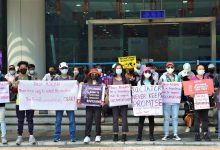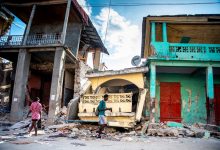Colombia’s peace process is taking ‘deep roots’, but all sides must work together to overcome lingering challenges
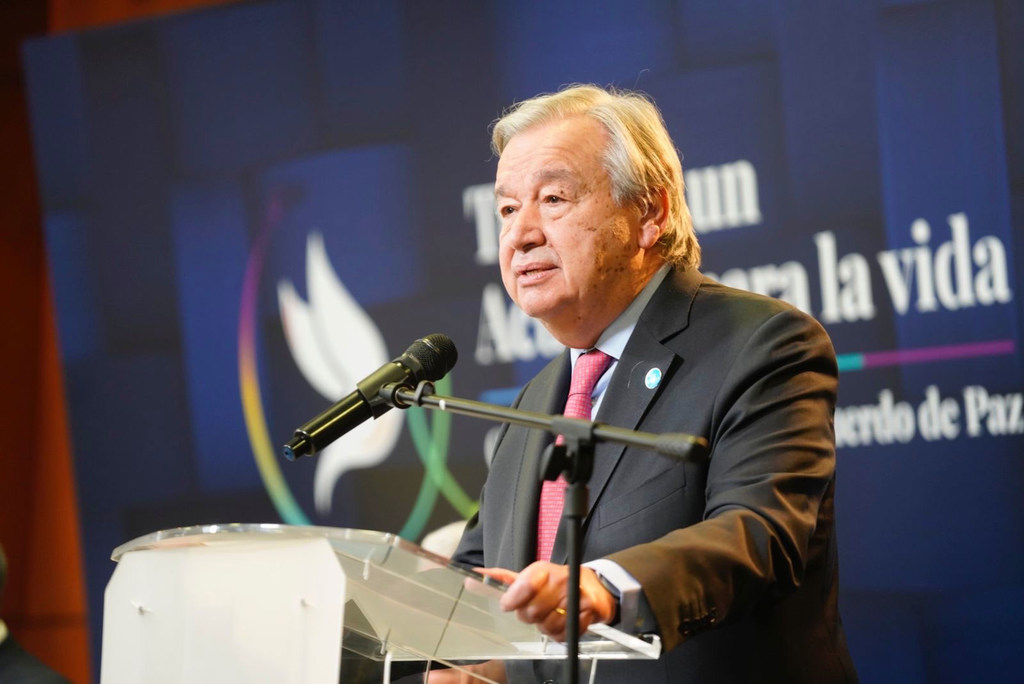 The signing of the Final Peace Agreement – five years ago today – generated hope and inspiration in Colombia and throughout the international community, and UN Secretary-General António Guterres said on Wednesday that the achievements are undeniable, and the country’s people should be proud.
The signing of the Final Peace Agreement – five years ago today – generated hope and inspiration in Colombia and throughout the international community, and UN Secretary-General António Guterres said on Wednesday that the achievements are undeniable, and the country’s people should be proud.
“As we take stock today, we can confidently affirm that the implementation of the peace process is taking deep roots,” Mr. Guterres said in Bogotá during an event commemorating the 2016 peace deal between the Colombian Government and that Revolutionary Armed Forces of Colombia, or FARC-EP, that ended the Western hemisphere’s longest-running war.
Speaking from the headquarters of the Special Jurisdiction for Peace, one of the main justice mechanisms created as part of the peace deal between the Government and the guerrilla movement, the Secretary-General said the fifth anniversary is a testimony to the commitment of the parties, but also of the State institutions and the vibrant Colombian civil society, facing all difficulties including tackling the COVID-19 pandemic.
Undeniable achievements
Among the “undeniable achievements” the accord has yielded, Mr. Guterres noted among others that the fact that a guerrilla that had waged armed combat for half a century is today a political party and that the majority of ex-combatants, some 13,000, are striving “admirably” to build new lives.
Moreover, he recalled his visit on Tuesday to Antioquia’s mountainside village of Llano Grande, where he had witnessed “determination in the face of adversity and uncertainty” as the local community, ex-combatants and police are now living and working side-by-side.
“I also witnessed how, with Government action and support, the expansion of locally designed development and social protection programs are bringing peace dividends to conflict-affected communities,” the Secretary-General said, adding that: “Ensuring the sustainability of these efforts will be critical in the future.”;
Colombia is an inspiring example: “In a world marked by conflicts, many of them without an end in sight, a peace agreement negotiated to end a conflict that many believed to be unsolvable is something extremely unique and valuable,” stated the UN chief.
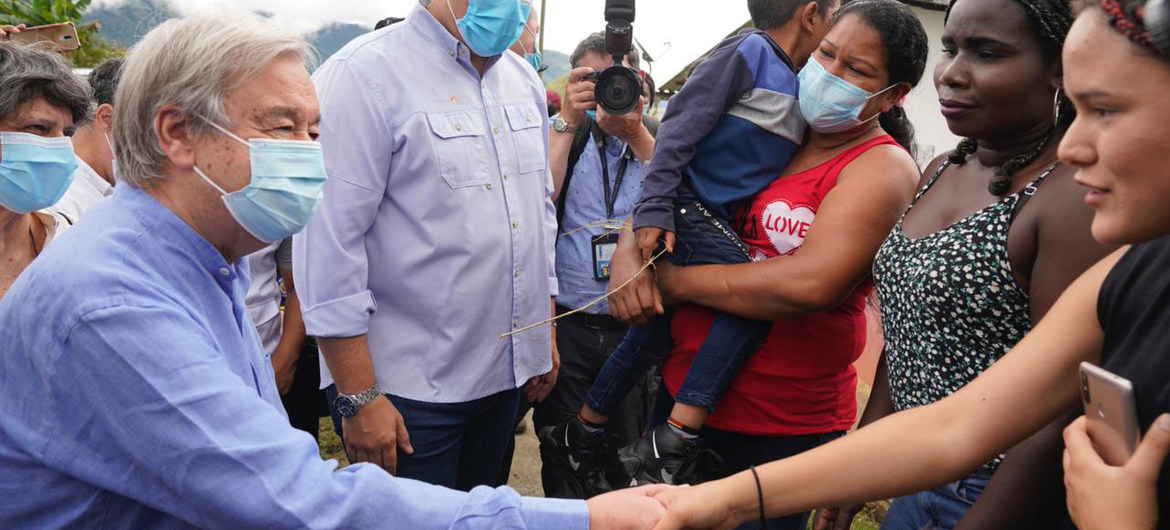
UNMVCSecretary-General António Guterres talks to villagers in Llano Grande, Colombia, where he witnessed how the peace process was developing in Colombia.
Hard won peace comes with risks
Yet, despite the solid progress, the Secretary-General cautioned that all sides “must be clear about the risks” that may threaten the long-term sustainability of the agreement.
“Ethnic communities and women and girls are always particularly affected,” said the UN chief, also spotlighting other factors that could contravene the deal, including violence by armed groups in connection with drug trafficking; threats and murders of ex-combatants, social leaders and human rights defenders, often women and indigenous populations; displacement and confinement; violence against women and sexual violence; and the recruitment of children.
Since the signing of the Peace Agreement, more than 300 ex-combatants and 477 human rights defenders and civic leaders have been killed, according to data from the United Nations Verification Mission in Colombia.
“Each death is itself a tragedy,” Mr. Guterres continued. “Each death sends a devastating message to these communities that still await the promises of the Accord.”
“I am confident of the express determination of the President that the security provisions of the Agreement will be fully implemented, as well as all the chapters on rural reform and solution to the problem of illicit drug trafficking and all the complexity that comes from the implementation of the Peace Agreement,” the Secretary-General stated.
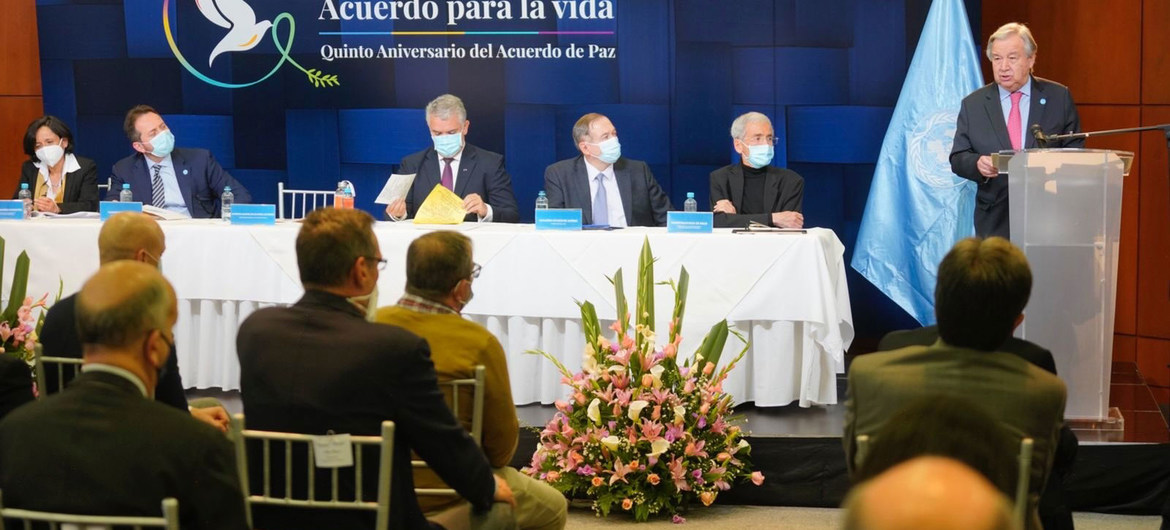
UNMVCUN Secretary General António Guterres delivers his speech at the Special Justice for Peace event in Colombia.
Challenges are part of the process
Despite these challenges to peace, Mr. Guterres said “it is not too late to reverse this trend”, and stressed that it would be necessary for the full implementation of the peace accord’s security provisions, as well as those dealing with rural reforms and tackling drug trafficking.
He recalled that the Peace Agreement itself reflected the reality of the fact that transformations of this magnitude will take time. “There are still ten years of what was initially planned” and “the challenges are part of the peace processes.”
“There are many issues on which you can disagree in a democracy, but peace can no longer be one of them,” he argued before making a call for Colombia “to remain on this path of peace-building and persist in overcoming challenges”.
To this end, he encouraged all Colombians to follow the roadmap set out in the Peace Agreement, which not only seek to silence the weapons, but “aimed at transforming the root causes of the conflict and beginning to heal the wounds, so that atrocities committed everywhere do not happen again.”
With those goals in mind, the UN chief noted progress on “the creation of a transitional justice system that aims at justice for victims and survivors, as well as ensuring lasting peace.”
Indeed, he said: “We have seen historical indictments for war crimes and recognition of unprecedented responsibility. We have seen emotional encounters that unite victims and those responsible. And we have seen how families finally come out of the uncertainty about the fate of their missing loved ones.”
Concluding his remarks, the Secretary-General said that “after more than five decades of conflict, and a deep awareness of the suffering it caused, we have a moral obligation to guarantee that this peace process is successful.”
Testimony of victims: infinite hope
Ahead of his remarks, the Secretary-General heard testimonies from victims, including of Ana Sofía Martínez, whose father disappeared 20 years ago after he was detained by the FARC-EP.
After calling on all parties, the Government and FARC-EP, to put aside their disagreements and fulfill their obligations, Ms. Martínez said she felt tired, sad and happy.
“Tired of bureaucracy and protocol; sad because disappearances continue to occur and the guarantees that the State gives about post-conflict activities are increasingly vague; and happy because in the face of so much adversity, we continue dreaming, sustained by infinite hope and more than one hundred thousand reasons. For the people still missing, we must hope. And we insist on action,” she affirmed.
Another participant was Father Francisco de Roux, President of the Commission for the Clarification of the Truth, who listed the positive actions by one side or another, but also stressed that unfortunately, no steps had been taken to achieve what he called “the great peace”: a peace that is above all party interests.
Also participating in the event were former President Juan Manuel Santos and former FARC commander Rodrigo Londoño, signatories of the Peace Agreement, and current President Iván Duque, as well as the current President of the Special Jurisdiction for Peace, Eduardo Cifuentes Muños, and other actors who promoted the negotiations that led to the signing of the Agreement. All recognized that there are still many challenges, but stressed that the peace process continues to move forward.


